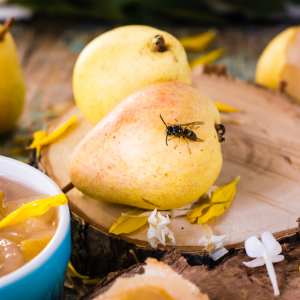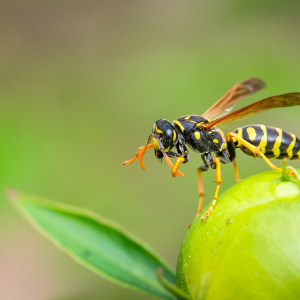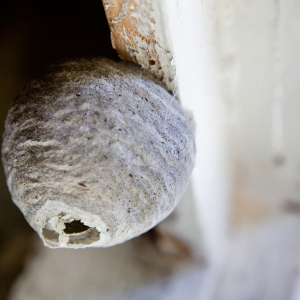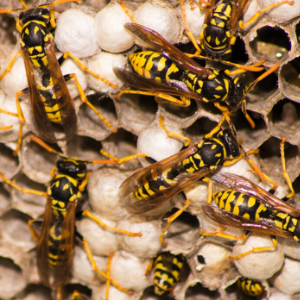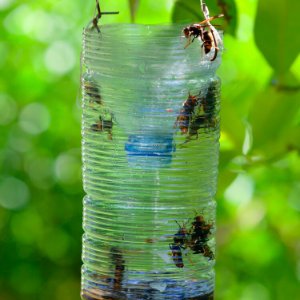A simple guide to keep wasps away this summer
/Wasps!…. The bad boys of the insect world (they definitely hang in the same crowd as spiders and daddy long legs). They are pollinators, like bees, but we just don’t have the same affection for them.
We understand that a wasp nest in your home or garden is not ideal, especially if you have family members that are allergic to stings. They are certainly a real nuisance when you are trying to enjoy a nice bit of alfresco dining.
In this article, we share with you our simple guide on how to keep the wasps at bay during the summer months.
Wasps: How to keep them away
Essential oils
If you seem to attract wasps, or if you are allergic, it is worthwhile to consider wearing wasp repellent the same way you would wear mosquito repellent.
Wasps and hornets (a rounder and fatter type of wasp) hate the smell of certain essential oils, mixing these along with some water in a spray bottle is a chemical-free alternative to purchasing repellent.
Peppermint or spearmint, lemongrass and thyme essential oil are known wasp deterrents, mix approximately 15 drops (of one or a mix of essential oils) to one cup of water and decant into a spray bottle.
You can also add washing up liquid to this mix and coat areas outside your home where wasps like to build nests: under eaves and other ledges or crevices. If you have previously had a wasp nest in your home or garden, target these spots as wasps will likely build nests in similar locations.
Related Content - Wasps: How to find the nest, the top 10 wasp nest locations in your home and garden
Avoid Wearing Yellow
You must have, at some point, had on a yellow t-shirt or dress and been chased around your garden by a wasp or other insect!
Bees and wasps don’t see colour the way we do, yellow and white are colours that are easier for them to perceive, hence why they are attracted to your t-shirt.
It may also be why yellow is the main colour of pollen. Which came first is a bit of a chicken and egg question!
Yellow is a colour that plants turn when they are under stress, insects will seek out yellowing plants as they believe, through millions of years of evolution, that the plants defences are weakened. It’s advisable not be wearing yellow if you are working in a garden, field or other area that is often frequented by wasps.
Make a Wasp Trap
Wasp traps work by luring the insects inside a container with some tempting treat, like sugar water, and then preventing them from escaping. You can make one yourself in about five minutes by sawing the top off a two-liter bottle and inverting it inside the bottom, or cutting a small hole in the top.
It's a good idea to put these in a location a little distance away from where you are working/socialising to detract them away from the area.
Patch-Up Cracks
If you want to keep wasps from invading your house, preventative measures are key by sealing up tiny cracks. The best time to do this is in late Autumn after most worker wasps have died off, or in early spring before nests become active.
Related Content - Summer Pests in the UK: How to keep your home and garden free from unwanted pests
Seal Waste Bins
Wasp problems are usually worse in gardens that have lots of food sources in the form of exposed rubbish, recycling bins, and composting food matter. Make sure to tightly seal the lids to your wheelie bins.
Related Content - Council Pest Control is it the best? Advantages & Disadvantages explored.
Cover your Food
It’s true that if you want to keep your food and drink wasp-free then cover it up. Keep lids and caps on and don’t leave anything out in the open air if possible. It is wise to pour cans into clear glasses so that you can see if a wasp has landed in it - nothing worse than getting stung in your mouth.
If you are using serving dishes on the table, then cover food once everyone has been served. You could always use reusable silicone stretch lids instead of cling film, to avoid excessive plastic use.
Related Content - Wasps: How to tell the difference between wasps and bees
Stay Still
This isn’t so much about deterring wasps but how to avoid getting stung. Wasps will only sting when they feel threatened. Wasps are more likely to sting you if you are moving and flapping around than if you stay very still.
It is a better option therefore to remain still, like a statue when a wasp is about rather than swiping it away or waving your hands about. These actions will only anger the wasp and make it feel threatened.
Need some further advice?


